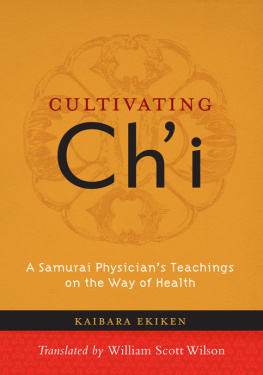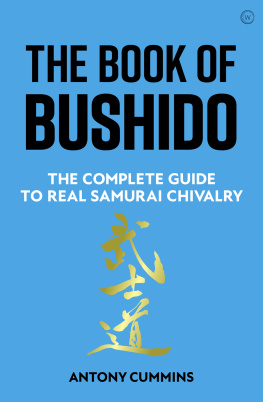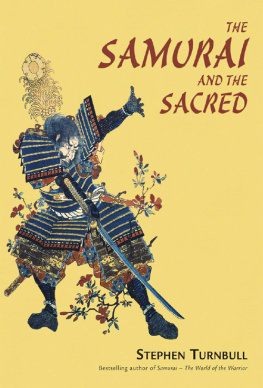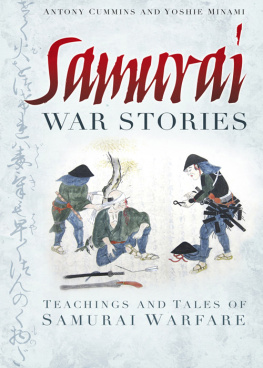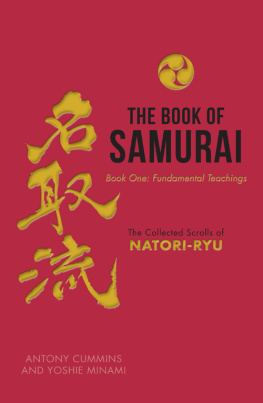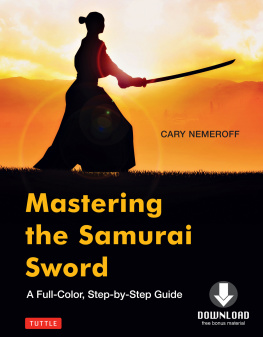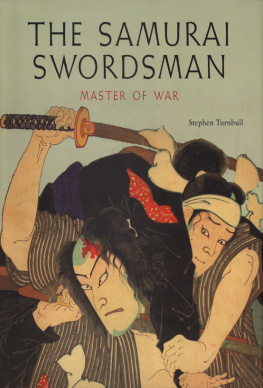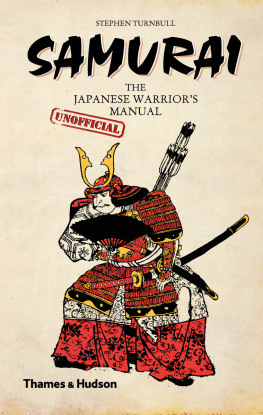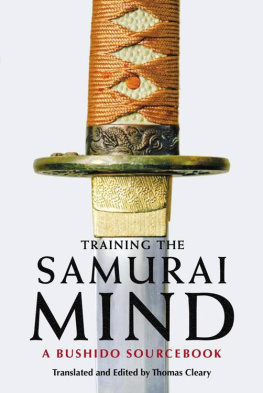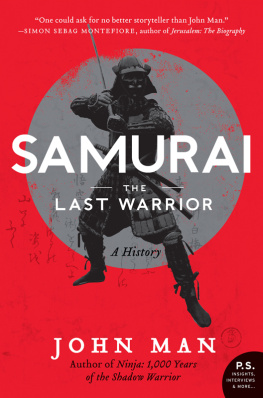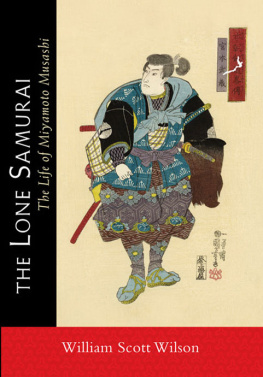ABOUT THE BOOK
Samurai are best known for taking lifebut here is a samurai doctors prescription for how to preserve life, and to make yours a long and healthy one. Unlike other samurai of his time, the samurai Kaibara Ekiken (16301714) was concerned less with swordsmanship than with how to maintain and nurture the healthy mind and body upon which martial techniques and philosophy depended. While serving as the chief medical doctor and healer to the Kuroda clan, he came to a holistic view of how the physical, mental, and spiritual lives of his patients were connected. Drawing from his medical practice, the principles of traditional Chinese medicine, and his life experience, Ekiken created this text as a guide to sustaining health and stamina from youth to old age. Ekikens advice regarding moderation, food and drink, sleep, sexual activity, bathing, and therapeutic practices is still amazingly intuitive and appropriate nearly three hundred years after this book was written.
William Scott Wilson is the foremost translator into English of traditional Japanese texts on samurai culture. He received BA degrees from Dartmouth College and the Monterey Institute of Foreign Studies, and an MA in Japanese literary studies from the University of Washington. His best-selling books include The Book of Five Rings, The Unfettered Mind, and The Lone Samurai, a biography of Miyamoto Musashi.
Sign up to learn more about our books and receive special offers from Shambhala Publications.

Or visit us online to sign up at shambhala.com/eshambhala.

This translation is dedicated to the memory of
Dr. Noble Jonathan David
and
Dr. Scottie Jackson Wilson
Shambhala Publications, Inc.
Horticultural Hall
300 Massachusetts Avenue
Boston, Massachusetts 02115
www.shambhala.com
2008 by William Scott Wilson
Cover art: Tsuba with design of ginger and bamboo crests. Photograph 2013 Museum of Fine Arts, Boston.
Cover design by Jim Zaccaria
This book was previously printed under the title Yojokun: Life Lessons from a Samurai. It is presented as a translation of a classic Japanese text and is not intended to replace medical advice or treatment.
All rights reserved. No part of this book may be reproduced in any form or by any means, electronic or mechanical, including photocopying, recording, or by any information storage and retrieval system, without permission in writing from the publisher.
Library of Congress Cataloging-in-Publication Data
Kaibara, Ekiken, 16301714.
[Yojokun. English]
Cultivating chi: a samurai physicians teachings on the way of health / Kaibara Ekiken; translated by William Scott Wilson.
pages cm
eISBN 978-0-8348-2846-9
ISBN 978-1-59030-988-9 (pbk.)
1. Self-care, HealthEarly works to 1800.
2. HygieneEarly works to 1800 3. Mind and body. I. Title.
RA776.95.K2512 2013
613dc23
2012035699
CONTENTS
PUBLISHERS NOTE
This book contains Chinese and Japanese characters. If you encounter difficulty displaying these characters, please set your e-reader to publisher defaults (if available) or to an alternate font.
The true meaning of the term bushido (the Way of the Samurai) has longand often heatedlybeen debated in Japan. Even today, well-educated and informed masters of the various martial arts will strongly disagree about the nuances and the deeper significance of the term. Nevertheless, many would agree that bushido encompasses the concepts of sincerity, selflessness, a measure of cultural attainment, martial skills, and a willingness to die for ones cause. The argument for this last concept, the willingness to die, perhaps reached its apex of expression in the eighteenth-century work Hagakure, with its famous phrase, The Way of the samurai is found in death. Although the death of the ego is emphasized in Hagakure as much as that of the physical body, the idea that the samurais Way finds its meaning in his demise has suffused modern thinking about the subject.
For this reason, I was pleased to encounter a work of the same period that is almost a mirror image of Hagakure. In total contrast to a stance of not valuing ones own life, the author of this very different work emphasized that a strong body, mind, and spirit were essential to the warrior. He reasoned that a man in the military class would be unable to carry out his duties if he were enervated or lived a short life. With the loss of your life, he wrote, you are good for nothing, and he argued that to hasten ones own demise is fundamentally stupid.
Over his long career, the author, a samurai doctor and philosopher known as Kaibara Ekiken, took notes on how a samurai might live a life of health in harmony with Nature, based on the maintenance of c h i, and was concerned primarily with how chi, the very essence of life, is affected by everyday activities such as eating, drinking, intimate relations, and even bathing. In Ekikens eighty-fourth year, these notes were compiled as the Yojokun (Lessons on Nurturing Life). The book is a clear departure from other samurai-class writings. Rather than a treatise on sword techniques or philosophical discussions on the unity of Zen and the martial arts, its focus is on how to maintain the healthy physical and mental foundation upon which techniques and philosophy depend. Thus, Taking care of your life is your first important work as a human being.
Although intended for the samurai class of his time, the Yojokun was soon in the hands of both rich and poor. It is still widely read today, and new editions in both modern and eighteenth-century Japanese appear regularly. In this edition, entitled Cultivating Chi, it is translated with the intention of broadening perspectives on warrior thought and of providing a historically esteemed health manual for those interested in traditional Oriental medicine. Omitted are sections concerning the specialized details on herbal drugs, acupuncture, and moxa, which would probably mean little to the modern reader.
The completion of any book project, no matter how minor, always depends on the help of a great many people. I would like to express my deep appreciation to my former editor at Kodansha International, Barry Lancet, for his initiating and encouraging me in this project; to Beth Frankl, John Golebiewski, and the entire staff at Shambhala Publications for bringing this book to fruition; to Ichikawa Takashi for supplying a number of editions of the Yojokun that had been unavailable to me; to Professor Laura Nenzi for her help with research materials; to Dr. Daniel Medvedov and Dr. Justin Newman for their invaluable advice and explanations concerning traditional Oriental medicine; to John Siscoe for his suggestions and encouragement; to my wife, Emily, for her patient reading of the manuscript and for making it far more readable; and to my late professors, Professor Hiraga Noburu and Dr. Richard McKinnon, without whose early guidance I would hardly have known where to start. Any and all mistakes are my own.
NOTE: I have included in the introduction a number of quotes from The Yellow Emperors Classic on Medicine (Japanese, Kotei Naikei Somon; Chinese, Huang Ti Nei Ching Su Wen: ), which I thought would be interesting, informative, or a good summary of the matter being discussed. This book, probably written early in the first millennium BCE, was one of Ekikens favorite sourcebooks, and remains primary reading for practitioners of Oriental medicine even today. Ekiken refers to this workthe title of which is often abbreviated as the
Next page
